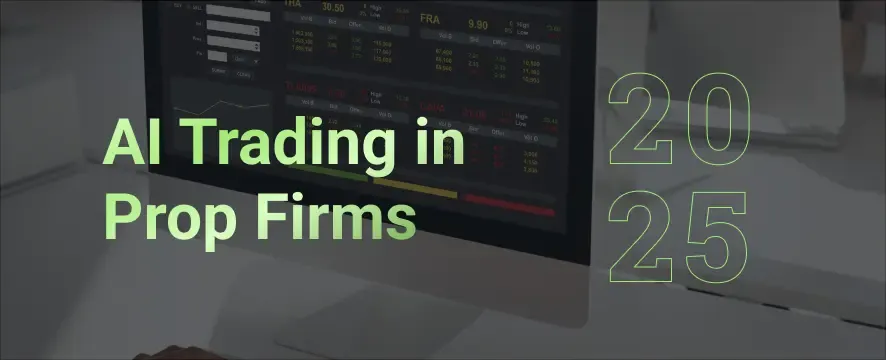
18 min read
Funded Trading Accounts Explained: Types, Benefits & How to Get One
A funded trading account gives you access to a firm’s capital to trade, share profits, and reduce personal risk.
17 min read
Share
Discover essential tips for selecting the right funded trader prop firm to match your trading goals. Read the article to find your perfect trading partner.

The prop trading firms industry has been a juggernaut in the financial space, with new prop firms popping up all the time, each one promising profitable trading partnerships.
A key offering of prop trading firms is capital access through funded accounts, which allow traders to access capital and trade larger positions using funded accounts.
But, like anything, it can be difficult choosing the correct prop firm to partner with, which is why understanding the key factors of a good prop firm is crucial. In this article, we will explain what to look for when choosing a trading firm, what to avoid, and how to make the best possible decision.
Prop trading, short for proprietary trading, is a dynamic approach in the financial world where traders use a prop firm’s capital to execute trades across global markets such as forex, futures, and stocks.
Unlike trading with your own funds, prop trading allows skilled traders to access significant capital, which can enhance trading opportunities—while also requiring greater discipline and risk control. Prop trading firms provide the infrastructure, funding, and support needed for traders to scale their trading activities without risking large personal capital, apart from the challenge fee.
As more aspiring traders seek to grow their trading careers, understanding how prop trading works—and how to choose the best prop firm—has become essential for anyone aiming for long-term trading success in today’s competitive financial markets.
Many new forex traders may not fully realize the challenges of trading their own capital. Not only can it be highly stressful (trading with your own capital, but it also limits your ability to trade as effectively as you would be able to if you had more trading capital.
This is why prop firms are gaining immense popularity – giving traders access to significant capital, which can reduce the need to risk large amounts of personal capital upfront, though traders still face evaluation fees and must adhere to strict risk rules, in exchange for favorable profit splits with the funded trading firms.
A prop firm, or proprietary trading firm, is a specialized trading company that empowers skilled traders by providing them with substantial capital to trade in various financial markets. These firms operate on a profit-sharing model: traders who consistently generate profits are rewarded with a share of those profits, while the firm benefits from the trader’s success.
The relationship is mutually beneficial—prop firms offer advanced trading platforms, robust risk management tools, and a wealth of educational resources to support traders at every stage of their trading experience.
By leveraging the resources and support that prop firms offer, traders can focus on refining their strategies, improving their trading performance, and ultimately generating profits in a professional trading environment.
But firms aren't just in the business of handing out free money to experienced traders. Rather, they employ a stringent evaluation process to accurately assess a trader's skills, discipline, and risk management before allowing them to trade a funded account.
With so many different prop firms popping up all the time, how do you know what to look for—and what to avoid? There's a few key things you can look out for; let’s dive into some of them.
Some leading prop firms – like broker-backed firms are genuinely focused on trader success, while others don’t. Why? Well, simply put: that’s how they actually generate revenue.
Most of the top prop firms charge evaluation fees as part of their business model, but the key difference lies in how much emphasis is placed on trader success versus fee collection. Some firms may be more focused on generating money through evaluation fees – and may even prefer it when traders fail, since they will be able to keep all evaluation fees, without paying out any profits.
However, broker-backed firms function as fundamentally different entities. Rather than generating mainly through evaluation fees, they make money when traders actually succeed in their trading. This creates genuine alignment and a ‘win-win’ partnership, where trader success directly impacts the firm’s bottom line.
Compare broker-backed models to other firms who aren’t really concerned with trader success and you’ll see why broker-backed models are preferable.
This might not seem that important a consideration, but it's definitely something you need to weigh up.
Prop firms regulated by the FSCA and those with FCA oversight are required to follow certain rules and guidelines, which should ultimately help to protect clients if problems arise.
Some requirements of regulated firms include:
Keeping traders' funded separate from operational capital
Maintain specific levels of capital
File regular reports
It's worth noting that some prop firms may purposely choose to remain unregulated for a number of reasons, and it's important to understand these reasons and differences when evaluating a firm's credibility.
Just take your time to do thorough due diligence before choosing a firm to partner with. If problems arise later with an unregulated firm, you’ll likely have no recourse.
This may seem obvious, but ensure the firm you choose has good technological infrastructure.
Trade speed and execution are of paramount importance, so having a reliable trading platform should be the first priority.
In forex trading, especially during periods of market volatility, a few minutes can be the difference between profit and loss. The last thing you want is for the trading platform to freeze for 30 seconds when you are trying to exit a winning position – only for it to turn into a losing position.
Other key aspects to look out for are the following:
Access to charting tools for technical analysis
Multiple different order type options
The ability to integrate automated trading tools, which is becoming increasingly popular
Check which trading instruments (such as forex, indices, equities, or commodities) are supported by the firm's trading platform
The best way to familiarize yourself with a trading platform is to trade using a demo account or to assess the platform’s features and responsiveness during the evaluation phase.
If you’ve decided you want to tread into the world of funded trading and need some guidance on what to look out for, here are some key considerations to help you evaluate prospective prop firms.
When choosing a prop firm, you'll want to pay careful attention to their reliability and financial transparency as markers of their credibility. Also, seek out firms that offer a competitive profit split and flexible options for payout.
There are a few key things to look out for when it comes to finances and payments:
Payment schedule: Does the firm have a reliable payment schedule where profits are paid to traders? Whether it’s week, bi-weekly, or monthly – look for a reliable payment schedule’
Withdrawal methods: What withdrawal methods does the firm offer? Is it just one method, or several? This can also enhance a firm’s credibility – although it’s just one of several considerations.
Transparent fee structures: When evaluating prop firms, look for ones that are very transparent with their fee structure. Does what they say make sense, or is it overly complicated? Do they clearly state their fees, or is it vague?
You also want a firm that is transparent about how it makes money. Are they genuinely aligned with trader success, or are they simply looking to ‘sell’ evaluation fees?
Red flags to look out for are firms that constantly have ‘processing delays’ or other ‘compliance requirements' when it comes to making payments.
Forex trading can be a lonely endeavor, and only those who have walked the road and felt the mental pressure will understand the emotional struggle of it.
This is why it's so beneficial to have a community of traders around you to offer support and share resources and knowledge. Good proprietary firms know this, and that's why most of them offer resources to help traders in this regard.
One of the defining features of prop firms is their ability to provide traders with access to large amounts of capital, essentially reducing some of the limitations that normally come with trading their personal funds.
As mentioned, this process of funding normally begins with an evaluation process that includes clear profit targets. During this evaluation, a trader's ability to make a profit, maintain good risk management, and deliver consistent results is measured.
These evaluations are designed not only to test actual trading ability, but also the trader's ability to maintain emotional discipline under pressure.
Once a trader meets the firm's standards, traders are granted access to a simulated or live trading account under the firm’s terms. Access to profits and capital is performance based, and can range from modest sums to six figures, depending on the trader's track record.
Forex trading stands out as a favorite among prop traders due to its unparalleled liquidity, volatility, and around-the-clock trading hours. Many prop firms specialize in forex trading, offering access to a wide array of currency pairs—including majors, minors, and exotics, so traders can capitalize on global market movements at any time.
To support their traders, prop firms provide advanced trading platforms like MetaTrader 4 and MetaTrader 5, which come equipped with real-time market data, sophisticated charting tools, and advanced analytical tools. By partnering with a prop firm, forex traders gain access to significant capital and the technological edge needed to execute their trading strategies effectively.
This combination of resources and support enables prop traders to enhance their trading skills, manage risk, and pursue substantial profits in the fast-paced world of forex trading.
Now that we’ve covered some things you should look out for, what are some warning signs – or red flags to keep an eye out for?
Yes, it’s true that prop firms make money (partly) from evaluation fees, but this should not be the primary means of income.
It should be trading success first, and evaluation fees second.
However, some prop firms have made trader evaluation the main focus of their business. Their revenue is primarily generated from evaluation fees, monthly charges, and platform subscriptions.
But how can you spot this?
Some warning signs include firms with super aggressive marketing who promise easy money, unrealistic results, and a frictionless path to trading success – with no, or limited effort.
One of the key things to look for in a trading firm is transparency. Therefore, it stands to reason that the opposite is a red flag.
How does the firm make its money? Are they transparent about it? If their answers are too vague, or there is a lack of transparency, you may want to dig a bit deeper.
Also, is their fee structure clear, or are there many hidden costs like maintenance charges, platform costs, withdrawal fees, and other miscellaneous expenses? Reputable firms should clearly disclose any data feed fees associated with futures trading, as these hidden costs can add up and are important to consider when comparing firms.
It’s not to say that all these fees are necessarily inappropriate, but there must be a level of transparency between firm and trader, and hidden fees can erode trust very quickly.
Another red flag is technology that is way outdated.
Outdated technology is not just inconvenient; it can be the difference between profit and loss.
Slow execution speeds, limited order types, random crashes, and minimal charting abilities can put traders on the back foot.
Just as the way a person carries themselves reflects the person, a quality trading platform can indicate the firm's commitment to their traders’ success. Plus, if the firm is cutting costs on its trading platform, are they in financial trouble? Where else may they be cutting costs? These are all questions for consideration.
When it comes to how funded trader prop firms operate, there are a few nuances for consideration. Different prop trading companies may offer traditional evaluation models, instant funding, or copy trading programs, each with unique terms and conditions.
The most common model is the evaluation–then–funding model. The way this works is that traders need to pass an evaluation phase, where they are required to achieve certain profit targets, avoid large losses and follow specific guidelines and rules.
If the trader passes the evaluation phase, they then receive funding.
However, there are usually actually two steps to the evaluation phase: the initial evaluation phase and a verification phase. Essentially, the verification phase is there to confirm that the trader passing the initial evaluation phase was not a fluke.
Typically, the rules and guidelines for the verification phase are less stringent than those for the evaluation.
Some firms may offer instant funding, where the evaluation process is bypassed altogether, but these will normally carry a higher upfront cost or modified terms and conditions.
Lastly, there are copy trading programs, where successful traders can earn extra money by allowing traders to earn additional income by allowing others to replicate their trades.
Most successful prop traders make anywhere from $3,000 to $25,000 a month. How much they earn depends on the size of their account, the profit split with the firm, and how steady their results are.
Some firms let traders keep a bigger share of the profits than others, so that can make a big difference in what you actually take home. Traders who do well and manage bigger or multiple accounts can earn even more.
But keep in mind—these numbers are based on consistent profits, and staying profitable is often harder than it sounds. Market conditions change, personal performance varies, plus there’s always a learning curve when transitioning to funded trading.
The path to achieve financial independence through prop trading exists, though treat it as the serious profession it represents rather than a side income or get-rich-quick scheme.
This question tells you a lot about what really matters to the firm. Are they making most of their money from sign-up fees and monthly charges, or do they earn more when traders actually succeed?
Ask them: How much of their income comes from winning traders compared to people just paying to take tests? If most of their money comes from successful traders, that's a good sign—they want you to win.
Some firms will give you a straight answer. Others might dodge the question or give a confusing reply—and that alone tells you something important.
Are they regulated, and if not, why? How are trader funds segregated and protected? What happens to money if the firm encounters financial difficulties?
These questions aren't particularly exciting, yet they matter significantly when problems arise. Regulated firms provide clearer dispute resolution plus standardized protections.
What trading platforms do they offer? How reliable is execution during volatile market conditions? Can traders access automated trading systems, advanced charting tools, and market data?
Platform quality often distinguishes amateur operations from professional setups. If they can't provide solid technology infrastructure, what other areas are they compromising?
What happens when traders have questions, technical problems, or account issues? How responsive is their support team during critical situations?
Quality firms invest in trader development because successful traders generate increased revenue. Poor firms treat support as a cost center to minimize.
Day traders need lightning-fast platforms plus reliable execution more than extensive educational content. Swing traders might prioritize flexible rules and larger account sizes over rapid payout schedules.
Different trading styles may require specific features or support from a prop firm, such as the ability to hold positions overnight or flexible risk management options.
Trading style, experience level, plus goals should drive selection decisions. What works perfectly for one trader might prove completely unsuitable for another.
Research beyond marketing materials and testimonials. Check trading forums, social media groups, and regulatory records where available to better understand the financial instruments offered. Focus your research on reputable prop firms with strong regulatory records and positive trader feedback. Look for patterns in complaints or praise rather than isolated incidents.
Start conservatively, even with extensive experience. Test relationships with smaller account sizes before committing significant resources.
Read documentation thoroughly. Understand all fees, rules, plus expectations completely. Surprises in business relationships rarely end positively.
If you really want to make a success of your funded trading, you need to approach it as an actual business venture, rather than just a trading experiment. You'll need to be disciplined, patient, and realistic about your expectations and the challenges involved.
The right prop firm partner will also give you support to grow in your trading career, not only access to a funded account.
Lastly, be prepared for multiple attempts—most successful prop traders didn’t pass initial evaluations.
The forex prop firms industry continues evolving with improved technology, clearer regulations, and more sophisticated partnerships between firms and traders, influenced by changing market dynamics. Both the firm and the trader benefit from a successful partnership, sharing in the profits generated through prop trading operations. Success comes down to picking a prop firm that actually fits your style and what you’re aiming for as a trader.
Leading prop firms get that looking after their money wisely is key if they want to stick around and succeed over the long haul. They put money into tools, support, and setups that make it easier for traders to stay on track and actually see steady profits—not get held back by their platform.
Some firms support more complex strategies like algo trading or high-frequency setups, hoping to boost their edge and make better returns.
The best prop firms are characterized by transparent rules, low fees, and strong support for traders. They reward consistent performance with higher profit splits and additional funding opportunities.
Choosing the right prop trading firm involves evaluating transparency, funding levels, and profit-sharing structures to ensure a secure and mutually beneficial trading environment.
Risk management is really important—position size restrictions are a key part of risk management policies, protecting the firm's capital by limiting the size of individual trades. Knowing what the firm requires in terms of risk management is crucial to maintaining and growing your funded account.
When finding a firm that truly wants traders to succeed because trader success directly benefits them—that’s when prop trading can deliver on its promises.
However, the truth is that even with the best prop firm partner, trading success ultimately lies with the individual's skill, discipline and commitment to taking their trading seriously and developing the right skills and mindset for it.
Trading with prop firms involves risk. Capital may be simulated, and traders are responsible for evaluation fees and following strict rules. Past performance is not indicative of future results.

18 min read
A funded trading account gives you access to a firm’s capital to trade, share profits, and reduce personal risk.

12 min read
Yes, some prop firms allow news trading. This 2025 guide shows which firms permit it, their rules, and how traders can benefit.

10 min read
A funded trader uses a prop firm’s capital instead of their own. Learn how funded accounts work, profit splits, and how to qualify.

13 min read
To become a funded trader in 2025, you must pass prop firm challenges by mastering strategy, risk control, and trading rules.

9 min read
Discover effective AI trading strategies for prop firms to enhance your profits. Learn practical tips to navigate the market successfully. Read more!
Get an insight from other users about SeacrestFunded and their experiences. 131K+ members and counting

Get instant access to weekly newsletter.